|
A month ago, I thought I would be balancing returning back from a service immersion trip and student leadership interviews. Today I sit in my makeshift home office preparing for my next Zoom call, trying to keep in check my own anxieties while still ministering to my students. To be honest, the first week was not easy, and I have still not mastered ministry from home and social distancing. As the days continue, I have progressively realized my need to change my mindset of survival to finding peace, stability, and hope. I went to Thomas Merton and St. Teresa of Avila, my two go to’s when needing to be reminded of where to find God. As I read the words of this Trappist monk and Carmelite nun, it dawned on me that in midst of darkness, fear, and chaos, I have been given an opportunity to create an inner monastery. The lives of these monastic friends of mine shed light on three aspects that I trust and can incorporate into my social distanced day-to-day in order to give me peace and calm my anxieties.
I invite you to share in the wisdom of the monastics and find the opportunity during these challenging times to create within our homes and families an inner monastery. Fears, sickness and hardship won’t be removed, but the insights of our brothers and sisters who have lived this life before us can help us to “recognize the possibilities and challenges offered by the present moment, and to embrace them with courage, faith and hope.” If you find it helpful, here is my Inner Monastery Routine. Finding balance will look different for each person, so take what works for you and make adjustments to fit your needs.
1 Comment
“I don’t want to grow anymore.” This cantankerous proclamation has lately become my state of being. It sums up my exhausted emotions as I finish a two year service program, study for my comprehensive exams, move back into my Mom’s house and struggle to land a job. In grumbling to my program director that Growing up is hard and I don’t want to do it, she shared with me a piece of wisdom: “You are never done growing and you are never done with being challenged. In the growing and in the challenge you come to a deeper knowing of God.” While still dealing with the overwhelming idea of constantly growing, I have come to find truth in these words. I realized that not only is growing up hard, but being Catholic calls me to this constant growth- this constant conversion of heart!
Being Catholic calls me to encounter the messiness of challenges, the hardship of changes, and the realization that I will always be growing until I am with God. St. Augustine in his Confessions writes of this conflicted desire to want the virtues of God, yet not ready to struggle with the realities of attaining them. St. Augustine shares, “Give me Chastity, just not yet.” This is how I feel. I want holiness…just not yet do I want to have to confront the realities to attain it. I want to know God… but not deal with the messiness. I want to be filled with the Holy Spirit… but I don’t want to face the growth that the Spirit leads me to. Margaret Silf, in her book The Other Side of Chaos, writes, “But we will also take the journey in faith—not the kind of faith that knows all the answers and has mapped out the right and proper path, but the faith that says simply, “I don’t know, but I trust.” She goes on to say, “It matters that you are willing to open your heart to a wider, fuller reality, one in which over time, or perhaps beyond time, you will know that ultimately every painful harrowing of your life’s field, and every anxious tending of new and tender growth, are leading to a harvest that you can’t begin to imagine.” I try to know all the answers and map out all the “right” paths. I don’t know if I want to open my heart wider to a fuller reality. I want a plan, a job, certainty, etc. I want anything that will keep me from feeling these anxious and unsettling emotions of transition and change. Yet, as my spiritual director would say, that is not of God. God is in the messiness; he is in the hardship of leaving a place I have called home for two years. He is in the humbling action of moving back into my Mom’s home. He is found in the rejection letters coming in from jobs. There is no room for God and the work of the Spirit when I decide I know best and try to plan my path. So here I am, left with no other choice than to sit in the messiness of transition and chaos. My wanting to be with God and to know God has brought me here and it is here that I continue to learn to trust that He is with me. It may take many years, or my entire life, to see how this time led me closer to His will and to understand the need for restlessness and messiness. But, there is no doubt that by encountering the messiness and seeking God in it, I am growing in a way that will enable me to become the apostle He is calling me to be! So encounter your messiness, lean into your hardships, and know wherever you are God can be found. Pam Tremblay is a collaborator with the Catholic Apostolate Center. Editor's Note: This post was originally published on June 11, 2013 "The fruit of sacramental life is both personal and ecclesial. For every one of the faithful on the one hand, this fruit is life for God in Christ Jesus; for the Church, on the other, it is an increase in charity and in her mission of witness" (Catechism of the Catholic Church 1134).
I am a liturgical - and sacramental - junky. Whether it be when the organ plays, the incense burns, wooden crosses process or babies cry- I love being part of liturgies! But my love of liturgy does not end with the communal gathering or the symbolic signs. Rather, the reason I love liturgy is that I believe, as Fr. Aidan Kavanagh, OSB, a liturgical theologian, put it, “liturgy is doing the world the way the world was meant to be done.” In the liturgy we are participating in the life of God. We are entering into, and living within, the eternal circulation of the Trinity’s love! But what does that actually mean? It means that we are not simply attending a gathering. We do not show up to another building for another event. It is not a lecture or a show. Rather it is a transformation of ourselves with our God, who is love, so we can go out and witness to that love and act out of it. This is why I love liturgy. It calls me out of myself. It shows me God acting in all things and then sends me out to be his hands and feet. Liturgy connects me to the Body of Christ and reminds me that I am to care for that body. It shows me that the world can be used to glorify God and that the world itself, being God’s creation, is a symbol of His active presence in my life. David Fagerberg, a professor of theology at the University of Notre Dame, illustrates this thought saying, “Water could be a sign of God’s love if I gave a cup of it to someone who is thirsty, but not if I use up on my golf course the water he needs for his vegetable patch.” Liturgy reminds and shows us how to act out of love, not pride; to live out of hope, not despair; and to be guided by compassion, not self interest. Pope Francis affirms that we must be a living Church: a Church for the poor, a Church that acts. He emphasizes that, “Jesus teaches us another way: Go out. Go out and share your testimony, go out and interact with your brothers, go out and share, go out and ask. Become the Word in body as well as spirit.” We encounter, learn and receive Christ in the Liturgy in order that might know Him and act as His Body for the world. This Sunday we must remember that we are participating in something that goes beyond the building, the preaching and the music. We must remember that we are encountering Christ and he is teaching us a way that asks us to share in his mission of building the kingdom of God by acting out of the truths of love, justice, kindness, and peace. Pam Tremblay is a collaborator with the Catholic Apostolate Center. She currently works at St. John's University in Queens, NY as Resident Minister for Social Justice. Editor's Note: This post was originally published on July 30, 2013 Being a “cradle Catholic” I never questioned why we had 4 different statues of Mary in our kitchen or why every May we put a crown of flowers on our “Garden Mary” outside. It was common to hear the advice of praying to the rosary if you couldn’t sleep and thus one would be able to find countless glow-in-the-dark rosary beads tucked into my bed. Almost every woman in my family had Marie as their middle name and like myself, if it wasn’t a middle name it was taken as a confirmation name. It wasn’t until college, living under the shadow of “Mary’s House”, the Basilica of the Shrine of the Immaculate Conception in Washington DC, that I began to understand that it was through Mary that I would come to know her Son. St. Vincent Pallotti understood this and had a deep connection with Our Lady and entrusted himself to her. He wrote “I resolve, my God, from all eternity and for all eternity . . . to love, honor and glorify my beloved Mother Mary; and to behold her loved, honored and glorified to the same degree that You, O Eternal Father, have showered her as Your Daughter, that You, O Divine Lord, have esteemed her as Your Mother, and that You, O Holy Spirit, have accorded her as Your most pure spouse.” (Soul of a Saint, p. 82) His devotion went beyond the pious practice of the time and enlightened a burning love within him. He spoke of Our Lady as, “Mother of Divine Love” and “Queen of Apostles.” It is said that he spoke, “I shall not rest until I, if this is possible, have achieved an infinitely tender love for my much beloved and much loving mother, Mary.” St. Vincent, in his deep love for Mary and a desire to be humble, work a silver reliquary box around his wrist with the image of the Mother of Divine Love painted on ivory mounted on it. He did this so that when people came to kiss his hand, a practice of that time, instead of kissing how own hand they would instead kiss the image of Our Lady. During this Month dedicated to Mary, let us look to St. Vincent as an example of how a love for our blessed mother can help us in reviving faith, enkindling charity and become an apostle of Christ. Pam Tremblay is a Collaborator with the Catholic Apostolate Center Prayer to Mary Queen of Apostles
Recently the small town in New Jersey that I have been living in for two years while doing service made its way into the national news. Unfortunately it was due to a toxic chemical spill after a train derailed about ¼ of a mile from my house. Within hours of the accident, the three other women that I live with and I were being evacuated from our home. Fortunately two alums of our program kindly opened their doors to us and welcomed us under their roof.
As the days of evacuation turned into weeks, the fun of being somewhere new changed to the reality of being displaced. Not knowing when we would be able to return home, I began, like any good theology student, making theological reflections on our condition within the current liturgical season. Being evacuated, displacement, relying on the kindness of others to welcome us in — a perfect analogy as we celebrate this season of Advent. Feeling a little like Mary and Joseph, I found myself discovering consolation in their story. Under the roof of a stranger, Mary was welcomed in. Under the roof a stranger, our savior was born. Under the roof of a stranger, God was born as man. From under the roof of a stranger, great things can come! There is more than consolation found in the connection of mystery to the season of Advent. The eschaton[1] we reflect on during Advent reminds us of the story that has happened in the past, along with the reality of Christ being present today with our hope for Christ to come again in the future. What is it that the kindness of these “strangers” welcoming me under their roof calls me to? St John of the Cross, a mystic and doctor of our Church, writes in an Advent reflection; “If you want, the virgin will come walking down the road pregnant with the holy, and say, “I need shelter for the night, please take me inside your heart, my time is so close.” Then under the roof of your soul you will witness the sublime intimacy, the divine, the Christ, taking birth forever…” We are called to welcome another under our roof: Christ. Like the alums who welcomed in my housemates and me or like the inn keeper who found room for Mary, Joseph and Jesus, we too are called to open the doors of our hearts and welcome Christ to find a home under the roof of our souls. Today, in the midst of this season of joyful anticipation, we are called to welcome Christ fully into our beings so that when he comes again He might welcome us, in return, under the roof of His Kingdom. If you want, the virgin will come walking down the road pregnant with the holy, and say, “I need shelter for the night, please take me inside your heart, my time is so close.” Then under the roof of your soul you will witness the sublime intimacy, the divine, the Christ, taking birth forever, as she grasps your hand for help, for each of us is the midwife of God, each of us. Yes there, under the dome of your being does creation come into existence eternally, through your womb, dear pilgrim- the sacred womb of your soul, as God grasps our arms for help: for each of us is his beloved servant, never far. If you want, the Virgin will come walking down the street pregnant with Light and sing. ~St. John of the Cross, Advent Reflection Pam Tremblay is the Blog Editor for the Catholic Apostolate Center. [1] Eschaton/eschatology: is the theology that deals with the end of times and the doctrine of the last things. We speak of the eschaton/eschatology in advent when we are reminded of our waiting for Christ in his second come at the end of time. “The fruit of sacramental life is both personal and ecclesial. For every one of the faithful on the one hand, this fruit is life for God in Christ Jesus; for the Church, on the other, it is an increase in charity and in her mission of witness" (Catechism of the Catholic Church 1134).
I am a liturgical - and sacramental - junky. Whether it be when the organ plays, the incense burns, wooden crosses process or babies cry- I love being part of liturgies! But my love of liturgy does not end with the communal gathering or the symbolic signs. Rather, the reason I love liturgy is that I believe, as Fr. Aidan Kavanagh, OSB, a liturgical theologian, put it, “liturgy is doing the world the way the world was meant to be done.” In the liturgy we are participating in the life of God. We are entering into, and living within, the eternal circulation of the Trinity’s love! But what does that actually mean? It means that we are not simply attending a gathering. We do not show up to another building for another event. It is not a lecture or a show. Rather it is a transformation of ourselves with our God, who is love, so we can go out and witness to that love and act out of it. This is why I love liturgy. It calls me out of myself. It shows me God acting in all things and then sends me out to be his hands and feet. Liturgy connects me to the Body of Christ and reminds me that I am to care for that body. It shows me that the world can be used to glorify God and that the world itself, being God’s creation, is a symbol of His active presence in my life. David Fagerberg, a professor of theology at the University of Notre Dame, illustrates this thought saying, “Water could be a sign of God’s love if I gave a cup of it to someone who is thirsty, but not if I use up on my golf course the water he needs for his vegetable patch.” Liturgy reminds and shows us how to act out of love, not pride; to live out of hope, not despair; and to be guided by compassion, not self interest. Pope Francis affirms that we must be a living Church: a Church for the poor, a Church that acts. He emphasizes that, “Jesus teaches us another way: Go out. Go out and share your testimony, go out and interact with your brothers, go out and share, go out and ask. Become the Word in body as well as spirit.” We encounter, learn and receive Christ in the Liturgy in order that might know Him and act as His Body for the world. This Sunday we must remember that we are participating in something that goes beyond the building, the preaching and the music. We must remember that we are encountering Christ and he is teaching us a way that asks us to share in his mission of building the kingdom of God by acting out of the truths of love, justice, kindness, and peace. Pam Tremblay is a collaborator with the Catholic Apostolate Center. She currently works at St. John's University in Queens, NY as Resident Minister for Social Justice. “I don’t want to grow anymore.” This cantankerous proclamation has lately become my state of being. It sums up my exhausted emotions as I finish a two year service program, study for my comprehensive exams, move back into my Mom’s house and struggle to land a job. In grumbling to my program director that Growing up is hard and I don’t want to do it, she shared with me a piece of wisdom: “You are never done growing and you are never done with being challenged. In the growing and in the challenge you come to a deeper knowing of God.” While still dealing with the overwhelming idea of constantly growing, I have come to find truth in these words. I realized that not only is growing up hard, but being Catholic calls me to this constant growth- this constant conversion of heart!
Being Catholic calls me to encounter the messiness of challenges, the hardship of changes, and the realization that I will always be growing until I am with God. St. Augustine in his Confessions writes of this conflicted desire to want the virtues of God, yet not ready to struggle with the realities of attaining them. St. Augustine shares, “Give me Chastity, just not yet.” This is how I feel. I want holiness…just not yet do I want to have to confront the realities to attain it. I want to know God… but not deal with the messiness. I want to be filled with the Holy Spirit… but I don’t want to face the growth that the Spirit leads me to. Margaret Silf, in her book The Other Side of Chaos, writes, “But we will also take the journey in faith—not the kind of faith that knows all the answers and has mapped out the right and proper path, but the faith that says simply, “I don’t know, but I trust.” She goes on to say, “It matters that you are willing to open your heart to a wider, fuller reality, one in which over time, or perhaps beyond time, you will know that ultimately every painful harrowing of your life’s field, and every anxious tending of new and tender growth, are leading to a harvest that you can’t begin to imagine.” I try to know all the answers and map out all the “right” paths. I don’t know if I want to open my heart wider to a fuller reality. I want a plan, a job, certainty, etc. I want anything that will keep me from feeling these anxious and unsettling emotions of transition and change. Yet, as my spiritual director would say, that is not of God. God is in the messiness; he is in the hardship of leaving a place I have called home for two years. He is in the humbling action of moving back into my Mom’s home. He is found in the rejection letters coming in from jobs. There is no room for God and the work of the Spirit when I decide I know best and try to plan my path. So here I am, left with no other choice than to sit in the messiness of transition and chaos. My wanting to be with God and to know God has brought me here and it is here that I continue to learn to trust that He is with me. It may take many years, or my entire life, to see how this time led me closer to His will and to understand the need for restlessness and messiness. But, there is no doubt that by encountering the messiness and seeking God in it, I am growing in a way that will enable me to become the apostle He is calling me to be! So encounter your messiness, lean into your hardships, and know wherever you are God can be found. Pam Tremblay is the Blog Editor for the Catholic Apostolate Center. Being a “cradle Catholic” I never questioned why we had 4 different statues of Mary in our kitchen or why every May we put a crown of flowers on our “Garden Mary” outside. It was common to hear the advice of praying to the rosary if you couldn’t sleep and thus one would be able to find countless glow-in-the-dark rosary beads tucked into my bed. Almost every woman in my family had Marie as their middle name and like myself, if it wasn’t a middle name it was taken as a confirmation name. It wasn’t until college, living under the shadow of “Mary’s House”, the Basilica of the Shrine of the Immaculate Conception in Washington DC, that I began to understand that it was through Mary that I would come to know her Son.
St. Vincent Pallotti understood this and had a deep connection with Our Lady and entrusted himself to her. He wrote “I resolve, my God, from all eternity and for all eternity . . . to love, honor and glorify my beloved Mother Mary; and to behold her loved, honored and glorified to the same degree that You, O Eternal Father, have showered her as Your Daughter, that You, O Divine Lord, have esteemed her as Your Mother, and that You, O Holy Spirit, have accorded her as Your most pure spouse.” (Soul of a Saint, p. 82) His devotion went beyond the pious practice of the time and enlightened a burning love within him. He spoke of Our Lady as, “Mother of Divine Love” and “Queen of Apostles.” It is said that he spoke, “I shall not rest until I, if this is possible, have achieved an infinitely tender love for my much beloved and much loving mother, Mary.” St. Vincent, in his deep love for Mary and a desire to be humble, work a silver reliquary box around his wrist with the image of the Mother of Divine Love painted on ivory mounted on it. He did this so that when people came to kiss his hand, a practice of that time, instead of kissing how own hand they would instead kiss the image of Our Lady. During this Month dedicated to Mary, let us look to St. Vincent as an example of how a love for our blessed mother can help us in reviving faith, enkindling charity and become an apostle of Christ. Pam Tremblay is the Blog Editor for the Catholic Apostolate Center. A Jesuit with the name Francis! No one saw it coming. For weeks now we have heard whispers of Cardinal Scola or Cardinal Turkson, while here in the States we have heard arguments for the candidacy of Cardinal Dolan or Cardinal O’Malley. Yet, no one thought a Jesuit would be next, even more so a Jesuit choosing the name Francis! As I watched the live stream on the phone with a good friend, he shared the following short phrase: “‘Francis, rebuild my church’ - how appropriate for this time in our Church.”
Bonaventure in his work Life of Francis wrote the following passage that is worth revisiting this day, as we reflect on the gaudium magnum which we received yesterday: “One day when Francis went out to meditate in the fields he was passing by the church of San Damiano which was threatening to collapse because of extreme age. Inspired by the Spirit, he went inside to pray. Kneeling before an image of the Crucified, he was filled with great fervor and consolation as he prayed. While his tear-filled eyes were gazing at the Lord's cross, he heard with his bodily ears a voice coming from the cross, telling him three times: 'Francis, go and repair my house which, as you see, is falling into ruin.' Trembling with fear, Francis was amazed at the sound of this astonishing voice, since he was alone in the church; and as he received in his heart the power of the divine words, he fell into a state of ecstasy. Returning finally to his senses, he prepared to put his whole heart into obeying the command he had received. He began zealously to repair the church materially, although the principle intention of the words referred to that Church which Christ purchased with his own blood, as the Holy Spirit afterward made him realize [...]” Although the event described by St. Bonaventure took place in 1204, this voice from the Cross fills our Church yet again, beckoning us to build up Christ’s Body and bring about God’s Kingdom through love. Similar to St. Francis’ initial reaction upon hearing God’s call, many of us are amazed at the news of who has been chosen as the next successor to St. Peter. But let us also follow in St. Francis’ footsteps by laboring zealously to repair the Church – both local and universal – with the guidance of Pope Francis who has already witnessed to us great humility, compassion, and strength. There is much more to say and to learn about our new Holy Father, but we cannot provide everything here. We invite you to visit our Pope Francis Portal for up-to-date information, videos, and resources on the newly elected Roman Pontiff, the humble servant of the servants of God – servus servorum dei. Pam Tremblay is the Blog Editor for the Catholic Apostolate Center. We are constantly taking in loads of information. Staff meetings, e-mails, classes, articles, blogs, ect ect. In one day I can easily find myself dealing with multiple tasks, countless problems, and in the middle of reading 3 or 4 different books. The question becomes not what was accomplished, but what was actually taken away? What, after a week of classes, a day of work, or time spent at a conference, was the take away?
Today marks the beginning of the second annual Mid-Atlantic Congress in which pastoral leaders of our Church on the East Coast gather in Baltimore. As was shared in Tuesday’s blog, it is a time of sharing knowledge, gathering tools, and forming relationships. Spending our days in prayer, breakout sessions and collaborative conversations, one is over loaded with wonderful information and useful tools. After three days of being laden with information and experiences the question becomes, “what is the take away?” I share with you my “take aways” from last year’s congress. These 6 pieces of wisdom have stuck with me throughout the year and have helped to strengthen both my faith and my work as an Apostle in the Church. Take Away 1: “When I don’t have hours I take minutes” ~Elizabeth Ann Seton. In the business of our lives it is hard to find the hours of contemplative prayer we would like and need. We must be reminded that when we can’t find hours we should not beat ourselves up, but rather take the minutes we do have to enter into prayer and conversation with God. Take Away 2: “Remember that you are called and chosen, loved and blessed. That you are the one that will bring others to Christ” ~Most Rev. Gerald Kicanas, Bishop of Tucson AZ. The Bishop then went on to say, “I have an ecstasy and terror of having been chosen in Baptism.” All of us in our Baptism were called and chosen to be apostles of Christ and we must remember that in being Apostles we are love and blessed, even in the midst of our own ecstasy and terror. Take Away 3: “The one handed Gospel” The Director of CRS, Dr. Carolyn Woo, shared Blessed Teresa of Calcutta’s “one handed Gospel”, in which Mother Teresa explained that the whole Gospel can be counted on five fingers, “You-Did-It-To-Me.” Every action that we take we do it to Christ, so let our actions be ones of compassion, care and love. Take Away 4: “Have a spirituality of Resurrection; love beats all- Joy over hate!” Fr. James Martin, SJ. As we have shared with you many times in our blog posts, Fr. Martin again reiterates that we are a people who “rejoice in hope” and that “joy, humor, and laughter feed hope.” In the midst of our struggles and our pains, we are reminded that we are called to be a people of the Resurrection! Take Away 5: Always come back to the Eucharist! Msrg Kevin Irwin shared that, “the Eucharist says you are accepted and you are not alone. It is what gives us hope and perspective.” Marty Haugen explained that “the Eucharist is radically welcome, radically relational, and radically transformative.” We must remember the gift the Eucharist is to us and the strength it provides us to do the work of God. Take Away 6: Love the Church! Paul Henderson, director of USCCB publishing reminded us that we are to “love the church…love knows no fear.” Most Rev. Gerald Kicanas, Bishop of Tucson AZ, also spoke in asking us to “strive to love the Church; she is a sinful, graced reality.” In the midst of trying times for our Church, let us never forget to love her and be grateful for all that she has done in showing us what is true and real. In the midst of this day, you are bombarded with information and details, my hope is that you are able to take away one of these take aways! I ask also that you keep in prayer all those who are participating in the Mid-Atlantic congress this weekend and for our Church at large, that through collaboration and sharing we might be able to live the Pallottine spirituality of reviving faith, rekindling charity and forming apostles. Pam Tremblay is the Blog Editor for the Catholic Apostolate Center. Mardi Gras, to me, is another example of the type of people we Catholics are—CELEBRATORY! How many other faiths enter into a season of contemplation, penitence and conversion with a party? Tonight, in my own community we will prepare for Lent by eating red meat—an occurrence that rarely happens in our house- drinking the rest of the good wine, and finishing the King Cake that was sent to us from our family down south. Many other Catholics across the country and world will follow suit- clearing their houses of all that they will be fasting from starting tomorrow.
The celebratory people that we are today are not denied tomorrow with the season of Lent. Rather, we recognize and value that to be a people who can rejoice completely and live fully alive we must first be a people of transformation and conversion. Richard Rohr writes, “If we do not transform our pain we will transmit it.” The season of Lent is a season to contemplate the pains in our own lives and transform them, so that in the rising of the Lord at Easter we can truly REJOICE. Tomorrow we put on Ashes from the palms that we waved when we rejoiced in the coming of Christ into Jerusalem last year at Palm Sunday. These Ashes do not show our holiness, rather they outwardly show our recognition that we are a people who need to convert our ways and transform our pains. During Lent we enter into the silence of contemplation to strip ourselves of all things that keep us from pure joy and blind us from recognizing God among us. Thomas Merton, a Trappist Monk and spiritual writer, stated the following about contemplation: “To enter into the realm of contemplation, one must in a certain sense die: but this death is in fact the entrance into a higher life. It is a death for the sake of life, which leaves behind all that we can know or treasure as life, as thought, as experience as joy, as being. [Every form of intuition and experience] die to be born again on a higher level of life.” This is what we celebrate today! We celebrate being a people who wish to enter into the realm of contemplation for the sake of transformation; to enter a realm of difficulty, pain, and struggle in order transform our experiences of joy and life into pure joy and eternal life. As Catholics we enter into the season of Lent by first eating rich foods, drinking merrily, and celebrating the lives that we have been given. This joy of being Catholic is then enriched when we can fast from all that distracts us from pure joy, give alms to those in which Christ resides, and deepen our relationship with our Savior through prayer. Today we start with a party and tomorrow we live the transformation that our hearts desire so that in 40 days and 40 nights we can fully celebrate the risen Lord and rejoice as a celebratory people! Pam Tremblay is the Blog Editor for the Catholic Apostolate Center. January 29th- that means sixteen days until Ash Wednesday, twenty days until the first Sunday of Lent, thirty-four days until Easter Sunday, and it doesn’t end there…. Although it has only been a few weeks from the end of the Christmas season, already my mind jumps to all the feasts and celebrations that we quickly find ourselves in. This might be due to the quick race into the Lenten season this year, but I think that it has more to do with my need to plan. I confess that I am a chronic planner. My room is covered in post it notes, I have multiple color-coded calendars for the different aspects of my life, and I find nothing more satisfying than crossing something off a to-do list. Although this is the reason that I am able to balance everything in my life, it is also the reason I tend to dread stillness and quiet. I can’t plan out stillness, I can’t know when it is going to end, and it usually doesn’t end in me being able to cross something off a list. Yet, it seems as though within silence I am overwhelmed by the presence of God that is made manifest in the solitude.
Although I tried to address the problem on my own, when I brought it up to a good friend of mine he stared at me for a moment then stated simply, “So you have finally decided to start listening to some of our saints?” His wise remark rung true in my heart. I avoid the silence, I avoid the solitude, I avoid listening to the wisdom of those who have gone before me. Many lips and pens of our Catholic spiritual masters speak and write about this realization of silence. St. Francis de Sales writes, “Never be in a hurry, do everything quietly and in a calm spirit. Do not lose your inner peace for anything whatsoever, even if your whole world seems upset.” Mother Teresa says “we need silence to be alone with God, to speak to him, to listen to him, to ponder his words deep in our hearts. We need to be alone with God in silence to be renewed and transformed. Silence gives us a new outlook on life. In it we are filled with the energy of God himself that makes us do all things with joy.” St Theresa of Lisieux states that if you “settle yourself in solitude…you will come upon Him in yourself.” While the cold wind howls and the silent darkness comes upon us mid-afternoon, let us take these last few weeks of winter to enter into the stillness. Let us know the wisdom of St. Francis de Sales and not be in a hurry for spring. Let us echo in our hearts the words from Mother Teresa reminding us that in silence we are renewed and transformed through the energy of God. And let us find in silence God residing within ourselves. In the words of the psalmist, “Be still and know that I am God (Ps 46:10)” Pam Tremblay is the Blog Editor for the Catholic Apostolate Center. “God became man so that man might become God” ~St. Augustine, Sermo 13 de Tempore
I recently went to a Christmas open house at the home of my housemate’s parishioners. Like most events during our two years of service, heads turn when they see a group of four twenty-something year-olds enter the room where the median age is 60+. The questions start flying: “Who are you?” “Why are you here?” “You go to Notre Dame- did you watch the last game?” “Are you single?” “Have you met my grandson?” The one that always gets me is some form of, “…wait, you’re 23 and you want to be a practicing Catholic?” Many times, not wanting to get too deep too fast, I simply shrug and say “Yeah, I must be crazy but I love our faith.” This time, maybe due to the Christmas spirit in the air, I could not contain myself and I blurted out- “THE INCARNATION!” As the woman stared at me and my housemates continued the conversation, I was left thinking; how could someone not want to be Catholic when we have the doctrine of the Incarnation? How could I ever leave a faith where I am deeply loved, completely known, and have the ability to not only know God but bring about His Kingdom in the here and now? In just a few days at Christmas Mass we will hear the Word proclaimed and we will hear that this Word became flesh in the form of a babe. It is tempting for us to sit at Mass thinking of all the things we have going on that day: the food to cook, the family to visit, the last minute gift to buy for the cousin we forgot about. Yet, at Christmas Mass we are told of a most unique reality, that God became human! This is RADICAL. No faith outside of Christianity professes that God took on human form out of love to unite himself with his creation. The Pastoral Constitution on the Church in the Modern World writes that “by his incarnation the Son of God has united himself in some fashion with every human. He worked with human hands, he thought with a human mind, acted by a human choice, and loved with a human heart. Born of the Virgin Mary, he has truly been made one of us, like us in all things except sin” (Gaudium et spes §22) ‘ Because of the Incarnation, Christ knows us completely. He knows our pain, he knows how we feel, and he knows what it is like to endure the daily realities of being human. But the Incarnation goes beyond even this great gift. God, in becoming human, transforms human tasks that simply get us from point “A” to point “B,” to tasks that are doing the will of God and making God manifest. As St. Augustine puts it, "God became man so that man might become God". REJOICE this Christmas season for we are given the news that we can become God! In the humble birth of a babe, the Word became flesh and our lives were transformed! Live with the knowledge that you are deeply loved and act in such a way that God is made present- this is challenge the Incarnation gives to us. Let us accept this challenge and live our Catholic identity with great JOY knowing the truths that the doctrine of the Incarnation makes possible. Pam Tremblay is the Blog Editor for the Catholic Apostolate Center. A few weeks ago my first niece was born. Needless to say, the pride of being an aunt flooded me and the joy of this news was shared with every person I spoke to. In these conversations I had one of those “you know you are a Catholic when” moments. The question that persistently followed “What is her name?” was “When is she going to be baptized?” This got me to think, “What’s the big deal?” And then the Holy Spirit hit me with, “PRIEST, PROPHET and KING!”
In infant baptism, we are not only cleansed of original sin and saved from “eternal damnation.” We are chosen and claimed. When immersed into the water with the Trinitarian rite – Father, Son, and Holy Spirit – baptism is signifying and actually bringing about “death to sin and entry into the life of the Most Holy Trinity through configuration to the Paschal mystery of Christ” (CCC 1239). But our rite doesn’t end there. As. Fr. Kevin Nadolski, OSFS, puts it, “we are then slathered in Jesus gel and given a crown of royalty.” In being anointed with Sacred Chrism, we are chosen by God, claimed by Christ and through the Holy Spirit are named priest, prophet and king (CCC 1241). St. Francis de Sales writes, “Be who you are, and be that well.” We, as baptized, are priests. We are prophets. We are royalty. The call as baptized disciples is to live these attributes and to live them well. Lumen Gentium explains that by our priestly duty we are called to “consecrate the world itself to God” (LG 34) through our works, prayers, activities, and daily responsibilities. It explains that as prophets we are to announce Jesus Christ by life and word and be witnesses to “life springing forth from faith (LG 35).” And lastly, that as His disciples we are named as His kings so that we too “might be constituted in royal freedom and that by true penance and a holy life [we] might conquer the reign of sin in [ourselves]” (LG 36). This winter, my niece will join us in our royal dignity and become a priest, prophet and king! At that time I will begin to tell her, “Be who you are, and be that well,” and will continue to say that as she grows. The challenging part will be looking at myself as a Baptized Catholic and answering the question, “Am I being who I am – priest, prophet and king – and being that well?” Pam Tremblay is the Blog Editor for the Catholic Apostolate Center. “I believe in dinosaurs!” tenaciously proclaimed the small third grade boy sitting in the front row. It seemed as though my conviction of teaching belief and our creed back-fired on me. My optimistic side gave me some consolation: “at least he believes in something.” And the third grader in me wanted to scream with him, “I love dinosaurs!” Throughout the next year I will be embarking on the adventure of teaching the Catholic faith to a bunch of third grade boys and girls. But the question that prompted the response of dinosaurs, “What do you believe?”, is not a question that ends with the completion of third grade religious education. It’s a question to be asked daily, to be wrestled with daily, and most importantly, to be lived daily.
Today, October 11th 2012, The Church begins her celebration of the Year of Faith. This is a faith that begins at baptism and brings us into the Triune God who is Love. In this faith we profess “the Father, who in the fullness of time sent his only Son for our salvation; Jesus Christ, who in the mystery of his death and resurrection redeemed the world; the Holy Spirit, who leads the Church across the centuries as we await the Lord’s glorious return" (Porta Fidei). The Holy Father is calling for us to CELEBRATE this faith! He is asking us to “rediscover the journey of faith so as to shed ever clearer light on the JOY and renewed enthusiasm of the encounter with Christ.” In short, he is asking us “what do you believe?” and “how do you live it?” Today, we also begin the renewal of our blog. As we, the Catholic Apostolate Center, celebrate this Year of Faith, we wish to share stories of lived belief through examples of discipleship and evangelization. We endeavor to be a place dedicated to reviving faith, rekindling charity, and forming apostles. It is a place to face the question “What do you believe?” Hopefully in our searching and questioning together we will be able to come up with an answer that goes beyond dinosaurs. Journey with us! Listen to our stories and share your own! Ask questions, post comments, share wisdom and resources. By virtue of our baptism, we are called to live our faith through the Christian charity. Journeying alongside one another, may we meaningfully celebrate this Year of Faith in order to shed light on the joy of our Catholic identity! Today I leave you with the question, “What do you believe?” Maybe it’s love, maybe it’s Christ, maybe it’s dinosaurs! St. Paul tells us to “examine everything carefully; hold fast to that which is good” (1 Thess 5:21). May our belief lead us to a deeper love of God, the Supreme Good! During this Year of Faith, may the love of Christ, rooted in belief, urge us on! (cf. 2 Cor 5:14) Pamela Tremblay is the Blog Editor for the Catholic Apostolate Center. |
Details
Archives
July 2024
Categories
All
|
About |
Media |
© COPYRIGHT 2024 | ALL RIGHTS RESERVED

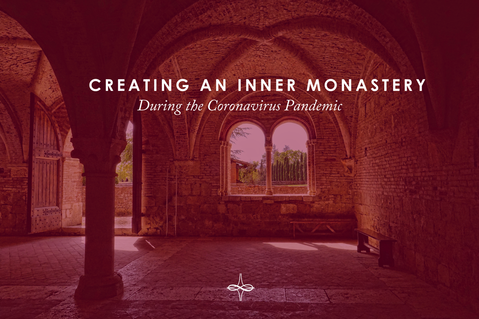


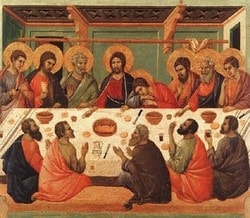
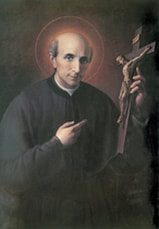
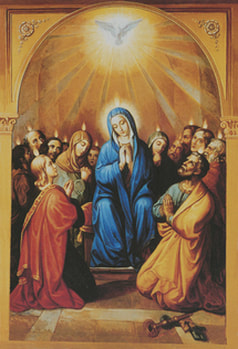

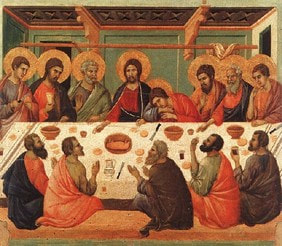

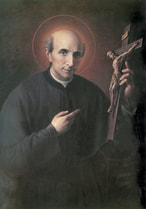
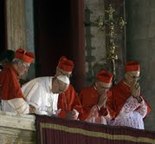
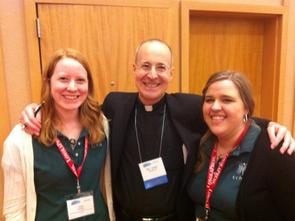

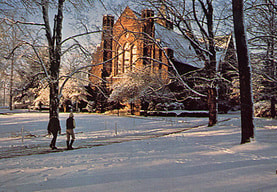
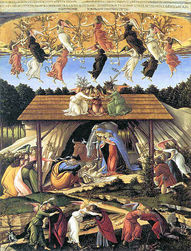

 RSS Feed
RSS Feed